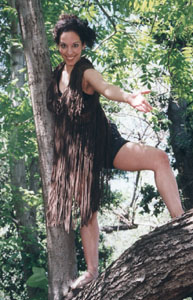![[Metroactive Stage]](/stage/gifs/stage468.gif)
[ Stage Index | San Jose | Metroactive Central | Archives ]
 Follow the Puck: Jennifer Fagundes stars as buoyant Puck in 'A Midsummer Night's Dream.'
Follow the Puck: Jennifer Fagundes stars as buoyant Puck in 'A Midsummer Night's Dream.'
Tending to Tradition A few small twists are all that City Lights needs to make 'A Midsummer Night's Dream' its own By Heather Zimmerman CITY LIGHTS Theater Company has established such a precedent for itself in staging unorthodox works that when the company opts for a traditional show, it can offer a jolt equal to some of the theater's more attention-getting fare. Indeed, for its season closer, City Lights delivers a big surprise in the company's very enjoyable production of William Shakespeare's A Midsummer Night's Dream. It's certainly not a flaw that the production tends more toward tradition, although this take on A Midsummer Night's Dream isn't without a few small twists--most notably that all the fairies have been cast as female, Oberon included (and the pronouns in the text changed to reflect this). In fact, Doll Piccotto plays a terrifically earthy, sensuous Oberon--a great foil for Lauri Smith's chilly Titania. The royals' entourage of fairies, headed up by Jennifer Fagundes, buoyant and slightly malevolent as Puck, has been reduced to two fairy servants, the giggly and almost incestuous duo of Peaseblossom and Mustardseed (Nina Breton and Lilly Small). Director David Kurtz sharply contrasts these fairies, who are inhabitants of the forest and, by extension, the natural, organic world (an idea the all-female casting reinforces) against the "civilized" world of the nearby city of Athens, where a frustrated gaggle of nobles butts heads over arranged marriages. Only in such a severe place could Egeus (Jim Johnson) threaten his daughter, Hermia (Jessica Teeter), with death if she doesn't marry the man of his choice, Demetrius (Frederick Goris), instead of the man she loves, Lysander (Bill Olson). The Athenians' costumes--stark, black-and-white turn-of-the-century garb by Jeanna Hurd--indicate that Kurtz has set the play in the late Victorian or Edwardian period, certainly a time known for its stringent social rules, but the direction doesn't always bear out that sense of restraint, as the performances are unevenly matched: the Duke Theseus (Rod Breton) seems a bit of a soft touch to be in charge of such a land, and though Shannon Zeig stands out in a vibrant performance as Helena (the woman Demetrius wooed before pursuing Hermia), she is so keen, so modern, among the group of meek lovers, one can only assume she's a suffragette, in spite of her submissive oaths to Demetrius. The actors playing the mechanicals, the Athenian citizens who stage a sensationally bad play to celebrate Theseus' wedding to Hippolyta, get a little bogged down in their initial rehearsal scenes, which tend to lack tight comic timing. However, the ensemble pulls off some really good bad acting in a final performance at the Duke's court, where James Lucas as Nick Bottom puts his character's bluster to excellent use as the overacting leading man. It may seem a contradiction, but City Lights' choice of a familiar work like A Midsummer Night's Dream offers an intriguing new look at a theater company that favors risks. A traditional production might appear out of place in the company's season, but it's the unexpected that keeps the company's audiences safely out of the confines of the "civilized" world of typical theater.
A Midsummer Night's Dream plays Thursday-Saturday at 8pm and Sunday at 7pm at City Lights Theater, 529 S. Second St., San Jose. Tickets are $15-$20. (408.295.4200) [ San Jose | Metroactive Central | Archives ]
|
From the June 7-13, 2001 issue of Metro, Silicon Valley's Weekly Newspaper.
Copyright © 2001 Metro Publishing Inc. Metroactive is affiliated with the Boulevards Network.
For more information about the San Jose/Silicon Valley area, visit sanjose.com.